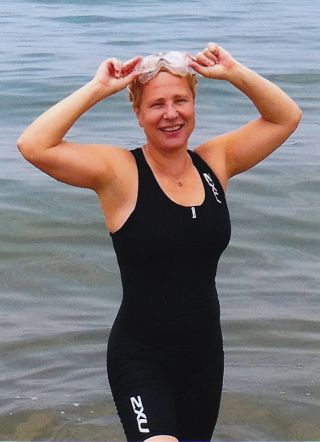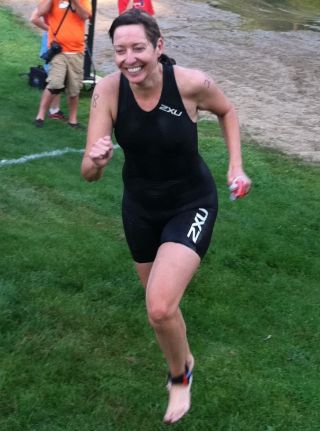(This blog represents a diallogue with my friend and colleague MK Czerwiec, the artist also known as Comic Nurse.)
The last Sunday in August, thousands of everyday athletes participate in triathlons.
We are two of them.
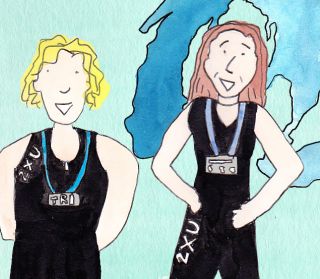
Alice: I love your drawing of us, and how you’ve placed us on the maps where our races were! You and I have talked about how much fun it is to know we are both doing triathlons at the same time, a few hundred miles apart. When I am swimming or biking or running and thinking of you, I also start thinking about all the other women and men out there doing the same thing as us, and I feel part of such a beautiful network of strugglers. To some people, your drawing must look a little like an ad for 2XU triathlon suits, so maybe I should explain that you recommended that brand to me. And this is one reason we both like to tri -- because you get to wear a suit that makes you look and feel like a superhero! This year, I added a Title Nine swim skirt to my ensemble because it turns out that my 2XU suit reveals a bit too much about my backside anatomy. (I found this out after last year’s race….)
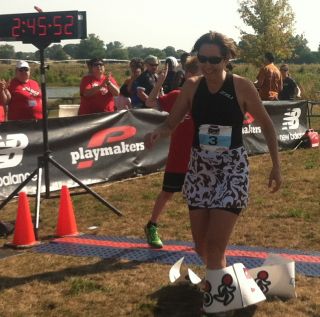
I just bought a new tri suit for next year, and when I put it on to try it out, my husband Aron swooned. Maybe I’ll wear it to bed one of these days! Seriously, though, it is really fun to put on this kind of suit and to feel like you could be The Flash.
MK: Maybe I should add little capes to the drawing. There’s something to be said for dressing up as a superheroine at least once a year.
Alice: I want a cape! At least on the bike. All this makes me remember back to a breakfast together a few years ago when we found out we were both training for triathlons. I know your interest in the sport goes back farther than mine, though.
MK: My triathlon adventures started in the summer of 1987 when I got back on a bike for the first time since childhood. It was the summer between my sophomore and junior years of college, I was twenty and living with my parents. I had gotten a job as a camp counselor about five miles away. My dad, who used to drive me everywhere, had experienced a stroke two years prior, and was no longer able to drive. My mom needed the car during the day so I couldn’t drive myself. I decided biking would be good for me, help me get some daily exercise. I was riding the blue Schwinn ten-speed my parents had gotten me around age twelve.
As the summer progressed, I got stronger, and I loved the feeling of freedom I experienced as I was able to go faster and faster. What I didn’t know at the time was that the joy I felt that summer was the joy of training: when you keep doing something over and over you get better at it, and it can change you. I was being physically and mentally transformed by my hard work. This is the first reason I still tri, to be reminded of this annually. But I’m getting ahead of myself.
The following summer I started biking for its own sake, harder, faster and longer as the summer progressed. My brother used his savings to buy me a state-of-the-art racing bike. He’s that kind of brother. Next summer I plan to fulfill a dream of mine and give that bike to his daughter.
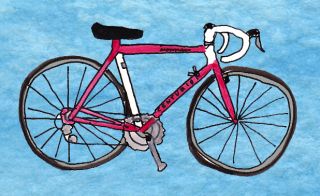
I don’t think I’ve told him enough how much this act of kindness and faith has shaped the course of my life in the twenty-five years since his gift, how it helped me to learn that I could rise to nearly any challenge if I properly prepared and had the right equipment.
That fall I learned that Chicago annually hosts the worlds largest open-field triathlon, and that it’s possible to form a relay team, with one person doing the mile-long swim in Monroe Harbor, one person doing the 25 mile bike on Lake Shore Drive, and one person doing the 10K run south along the lakefront. I found two people willing to undertake this crazy adventure with me. We called ourselves Team Risk. It was terrifying and exhilarating.
A few years later I found myself in my last year of nursing school. My father had recently passed away, and I took up biking again out of necessity, to get from my North side apartment to school on the near South side. Uncharacteristically fearless that summer, I fought busses and cars up and down Ashland Avenue. As the year went on, I again felt myself getting stronger. I broached the subject of forming a team with two fellow nursing students. As I sit here I can’t remember our team name, but I do remember that it stormed terribly that day, and whether or not the race would be called off was touch and go. I rode Lake Shore Drive in a punishing rain. It was more terrifying than before but also more exhilarating. I finally understood what Annie Dillard meant when she wrote in Pilgrim at Tinker Creek about “stalking the gaps” of our lives, “you’ll come back dribbling and crazed.”
Fast forward through my years as an AIDS nurse, when I don’t think I did the tri, but I might be wrong about this. There were many, many other lessons to be learned during that time.
Fast forward to turning forty. I’d decided that I wanted to do something monumental, and the Gay Games were going to be in Chicago that summer, and there would be an open field half marathon. So I decided to start running. Running had even more advantages than I ever imagined, and the benefits were as transformative as biking. I did the half marathon that year, and a few other shorter organized runs.
Later that summer I came to realize that now that I’d been running, I could do something I never thought I would do, a different leg of the relay triathlon. I managed to find friends up for the challenge. I can’t remember why but we called ourselves the Pink Flamingos.
A few years later, 2010, more pals were game to tri. Mike did the bike, Mark did the swim, and I again ran. We were Team Posse, after the name we use to refer to our group of pals who travelled to Montana the prior year. The 10K was especially gratifying for me that year as I had herniated a disc in my back that February, and the focus of training for August helped me get through the pain and the laborious physical therapy.
I had this pattern from age 21 of at least every five years or so doing one leg of a tri. Impossible was the idea of doing the entire thing myself, because though I could bike and run, there was no way I could ever swim a mile, let alone a mile in the open water of Lake Michigan.
But why not? Why did I believe this? Why do we believe certain things about ourselves, without ever challenging them? There was also a time when I thought, wrongly, that I could never run.
So that year my new year’s resolution was to do the sprint distance of the entire triathlon myself. I trained in a pool, and it turned out swimming a mile wasn’t that difficult. And like biking and running, it transformed me in a new way. I loved what it did to my upper body and my mind. Then I started swimming in open water, which I found incredibly exhilarating. The 2011 Sprint tri, my first not on a relay team, was newly terrifying but again incredible. Training that summer taught me something that’s helped me tremendously since: how to manage transitions.
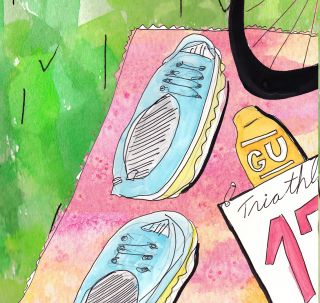
I mean this very literally. To do all three legs of a triathlon you must not only train for months, but success critically depends on mentally walking yourself through the entire event and being properly organized, strategic, and prepared. You need to know what you will need, and exactly what to do, during the two transitions of the event, from swim to bike and then bike to run. You forget one thing, like your helmet or goggles, and most likely you’re out or your performance will be drastically impaired.
It’s an extension of some advice I once heard a firefighter give a class of third grade students. The teacher asked the firefighter, “what is the most important lesson you could teach our kids today?” And the firefighter, an African-American woman, about sixty years old, said, “Always lay your clothes out the night before.” She went on to describe how important it was for firefighters to be ready for the next challenge, in a very concrete way - the hoses have to be properly re-coiled, their coats and boots need to be put back where they belong. They always need to be staged and ready for the next fire. For the students, she said this translated to thinking through what the next day’s challenges will be, and how they will face them, be their best, have what they need, down to what they will be wearing and what needs to be in their school bag. That advice kept coming back to my mind when I prepared for that first full triathlon. I use that lesson in all other aspects of my professional career.
Alice: That’s funny, because I still haven’t mastered the transitions in triathloning, nor in my professional career, ha! I’ve only done 2 triathlons and right after this most recent one, I made a list of things I need to do better next year, including having a foot bath (to get the sand off your feet to prevent blisters during the run -- see my left big toe as evidence of the problem) and having much more water readily available. I think professionally I have some blisters, too, so I’m going to think more about the transition metaphor.
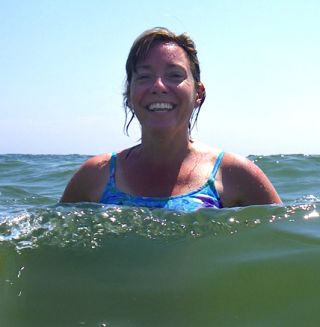
As a kid, I did some running but especially loved biking and swimming. I grew up on Long Island and our mom took us all the time to the ocean, so I grew up doing open-water swimming in the Atlantic. Just a few days before my tri this year, I was visiting my parents with my son and took him to Jones Beach. Once again, I got to enjoy the total thrill of ocean swimming, and I was so wishing my triathlon could be at the ocean, a kind of water that feels much more natural to me than Midwestern lake water ever will.
I started a new round of exercising when I turned around 40 or 41, when my son was around 7 years old. This happened mostly because I was working on an investigative history of an ugly controversy and some of the people involved started threatening me. I found I really needed to run to burn off the stress. From there, I got back into regular biking and swimming, too. At some point, a neighbor suggested I try a local sprint triathlon, the Playmakers’ Classic Tri in Lansing, Michigan (where I live). I trained hard for it, but then I had to miss it because my parents suddenly had 5 medical events in 2 days. (I wonder to what extend our vigorous exercising is a response to fears about our parents’ disabilities?) I was so disappointed, but the organizer assured me he would make me the first enrollee for the next year’s tri.
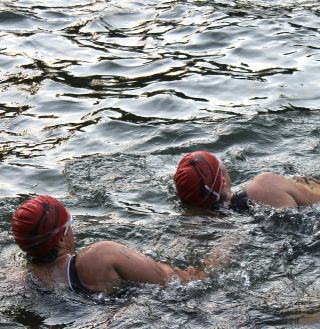
The next year I was able to do the tri. My neighbor Ruth kindly did the swim next to me, because I was nervous, and the water was really disgusting -- it was full of weeds and tasted like gasoline. When my energy lagged, Ruth asked what country song she should sing to me, and all I could think of was “Country Roads” by John Denver. So we were both swimming, singing “Take me home, country roads, to the place, I belong…”
The lifeguard nearest us was laughing and yelling, “Less singing, more swimming!” Ruth took off like a bullet after we exited the water (I told her that’d be fine) and I hit the bike on my own. By that time, I was working on the third major controversy of the book I’m finishing, the one that really beat the crap out of me, and I spent the whole bike and run focused on that work, telling myself, “If you can do this, you can handle that,” and vice versa. I was so happy when I finished the 600 meters swim, 14 mile bike, and 4 mile run in a little over 2 hours.
This year, they moved the race to a much nicer lake, in St. Johns, Michigan, and extended the bike to 18 miles and the run to 4 miles. I wasn’t sure I could do it -- I didn’t train well this year -- and I had a lot of voices this time saying, “You can’t do this,” but after it was over, I felt that bliss. My partner Aron was there at each transition looking so proud and saying, “Look at you! You’re doing it!” and I felt just as happy as I did having him do the same when I gave birth. It felt like I was doing it with him. I never would have thought, when I was 40, that I could do this at the age of 47.
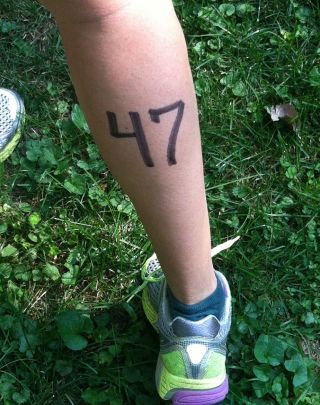
I’m happy that number marking my age on the back of my leg didn’t wear off until days later, because it meant that people who know about triathloning were giving me thumbs-up for days afterwards, and that felt great.
A couple of days ago, after Aron heard me talking about you thinking about doing a whole “Olympic” tri next year, he looked up the distances and started encouraging me to try that, so that you and I might both do full Olympics (1 mile, 25 miles, 10k) next year. I know you’ve recently had to pull back on the run?
MK: Right, last year I thought I would do the sprint again, to try to improve on my time, but I was back on a relay team due to a knee injury. Another lesson learned via tri: don’t abandon a planned challenge, adapt it. My partner Cindy did the bike, something she thought she could never do, but not something she particularly enjoyed, as she is not a group activities kind of person. She did it as a favor to me. She’s that kind of partner.
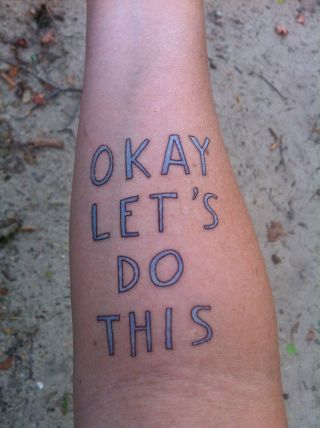
This year, knowing I had a knee injury, and thinking I couldn't run again, I enlisted a previous year’s biker, Mike, who was willing to take on the challenge of running. But I boosted the challenge from the sprint distance back to the Olympic distance. And for the first time I did two legs of the team - the swimming and the biking. I got us the perfect Tattly temporary tattoos for the occasion.
As you mentioned, I decided days before this year’s race that, if it went well, I would train for the full Olympic distance next year. Another reason I tri: it keeps me moving forward.
Alice: Definitely. I find it helps me feel like I’m still stretching myself as a person. And to be honest, it’s been easier than learning how to play the clarinet at 47 has been! I like how it is a three-part event that forces me to find a kind of balance in approach. It all becomes a metaphor for balancing the challenging parts of life. And there’s no question that the physical activity dramatically improves my mental health. These days, when I am given an assignment by a newspaper editor for an editorial on short deadline (“we need it in 4 hours”), I often start by going for a swim or a run, as I find it clears my head and puts my brain in gear.
I also love just being with the people who tri and who cheer us on. It feels like such an amazing community event. The women in the 40-and-over (last) start group all take a few minutes before the start to encourage each other and admire each other’s determination to finish in spite of injuries, interruptions of training, and aging. As we go out onto the roads, people come out to their front yards and ring cowbells and yell encouragement. I get passed by women and men 20 years older than me, and I love that as they pass, they say, “You go, girl!” You look at the bodies and you realize many of them are not the kinds of bodies about which you’d immediately think “that person does triathlons,” and that always makes me remember not to assume limitations about particular body types, including my own.
MK: 

MK:
I spent more time than usual at this year’s tri just watching and listening to the other participants. (There are seven to eight thousand people in the Chicago tri these days.) I noticed something I hadn’t focused on before - the diversity. Chicago is a diverse city, and the tri reflects that diversity - perhaps not as much as it might, or could, but it’s definitely there. You see flags of many countries, see skin in the full range of shades, and hear many languages and accents.
The diversity is physical as well. You’re right that there is a stereotypical body type of triathletes: lean, muscular, and tall. Certainly the pros have that body type. But the average triathlete I watched this year is far more average-sized than you might imagine. I saw all body types racing - and finishing - all three legs of the triathlon. I saw a woman who was about 5’5” and must have weighed at least 300 pounds who crossed the finish line with power, then saw her friends next to me cheering her and yelled to them, and to all of us, “that was awesome!”
Crossing the race course to get to the lake, I saw a man of about sixty with a dramatic spinal curvature starting his run, which meant he’d already finished the bike and the swim. There are, of course, the parathletes, who are moving to watch. As I stood around and listened to families and athletes talk, I realized just about EVERY person in the event has a story explaining how they got there, why they were there, what they overcome physically and/or emotionally to be there. It can make your heart swell. Another reason I tri: to be in the company of these inspiring stories.
Alice: Our race had only about 150 participants but I know exactly what you mean. There is a combination of personal humility and pride about humanity that you can only really get in this sport, I think. I think your pair of “selfies,” of before and after the race, perfectly captures that!
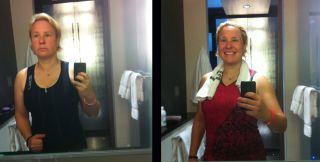
Before, you feel trepidation, humility, but also some determination. (Not to mention fear of humiliation because you told everybody you were going to do this!) After, you just feel happy happy happy. It’s done, and it’s one of those things that you’ll always have. It really does remind me of a good birth experience.
MK: You mentioning tri photos reminds me of another reason I keep tri-ing, having those empowering images of myself.
Alice: Yes!!
MK: I keep them around our house, specifically in my dressing and working areas. Come February, when I’m not motivated to exercise, and perhaps am feeling a bit crap about my body and myself, those photos remind me of my power. There are days when I can’t believe that’s me, but I know it is. Those tri photos really help me. Having new photos every year seems more important now that I’m over 45, because I can’t look at them and say that was a me from a bygone youth. It’s me, now. And as long as I keep tri-ing, it’s who I will continue to be as I age.
Alice: That’s right. And it’s one reason I especially love one picture that I have from after my first triathlon with Aron and our son. Our son accidentally wore his “Failure is Always an Option” shirt, but I love that, because it reminds me that trying (and tri-ing) sometimes involves failure, and that’s okay. You can’t go into new life experiences without the understanding that yeah, you may fail, but knowing you might fail can’t stop you from trying. That lesson has been the biggest reward for me in tri-ing. When I start my run, I often listen to this song from “Pink”:
Where there is desire
There is gonna be a flame
Where there is a flame
Someone's bound to get burned
But just because it burns
Doesn't mean you're gonna die
You've gotta get up and try, and try, and try
You gotta get up and try, try, try
